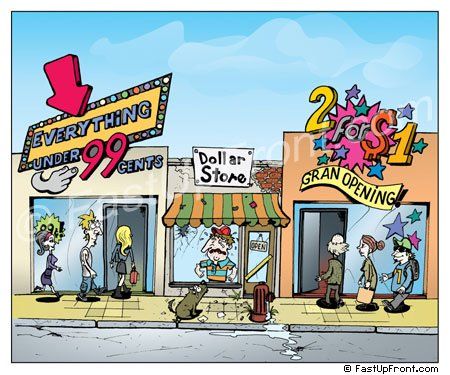A Perfectly Competitive Market is a market system in which there will be a large number of buyers and sellers, the product to be considered will be homogeneous or similar, buyers and sellers will have full knowledge of the market, buyers and sellers will have free entry and exit rights to the market and there will be no control over the price etc. Simply, a market in which a large number of buyers and sellers can freely buy and sell a homogeneous product at a fixed price without any restrictions is called a Perfectly Competitive Market.
In a Perfectly Competitive Market the price of a product is determined by market demand and supply and it is not possible for the buyer and seller to change this price. Because the demand of a buyer is a small part of the entire market demand. Similarly, the supply of a seller is only a very insignificant part of the market supply. Because of this Once the price of the product has been determined, it is not possible for the buyer and seller to change it. Thus, the price determined by market demand and supply is called equilibrium price.

Conditions or Characteristics of Perfect Competition
There are a number of conditions / characteristics / assumptions to be a Perfect Competition in a market, which are mentioned below-
Large number of buyers and sellers
The position of a buyer or seller in such a market is like a drop of water in the sea. Due to the large number of buyers and sellers, a buyer or seller in such a market cannot have any effect on the price. For this reason, the buyer or seller buys or sells the product at a fixed price.
Homogeneous product
The second feature of a perfect competitive market is that the product will be homogeneous. What are homogeneous products? If every unit of a product is exactly the same in terms of quantity and quality, it is called homogeneous product. Simply put, a unit of product which cannot be separated from another unit is called a homogeneous product.
If the product to be considered in the market is homogeneous, there will be no buyer bias towards any seller. As a result, buyers and sellers will be forced to buy or sell the product at the same price.
Perfect Knowledge about Market
Another condition of a perfect competitive market is to have a complete knowledge of the market and the price of the product. Because all buyers know the latest price of the product; In this case, if the seller tries to sell the product to the buyer at a higher price, then the buyer will go to another seller and buy the product at the fixed price. Similarly, all sellers are aware of the price of their products. So, if the buyer expects the product from him at a lower price then he should be disappointed.
Free entry and Exit of the Firm
Another feature of a perfect competitive market is that the farm can enter or exit the industry in the long run. There are no restrictions in this regard. Since in the short term the firm cannot change the size of its plant and new firms cannot enter or exit the industry, the condition of firm entry and exit into the industry will only be effective in the long run. If in the short run the firm makes an unusual profit, then in the long run the new firm will enter the industry in the lure of extra profits. But if the firm makes losses in the short term, the firm may leave the industry in the long run.
Perfect mobility of Resources
Factors of production can move freely from one industry to another. For example, if a worker gets higher wages in an industry, he can leave the previous industry. There are no internal or external restrictions on the movement of materials between different industries.
Zero transport cost
Another feature of a perfect competitive market is that the cost of transporting goods is considered zero. Therefore, the price of the product is the same in different markets.
Rational Behavior
The last condition of a perfect competitive market is that buyers and sellers in such a market will behave rationally or they will be conscientious. The seller will not sell the product below the market price by treating any buyer in a biased manner. Again, the buyer will not buy the product at a higher price.